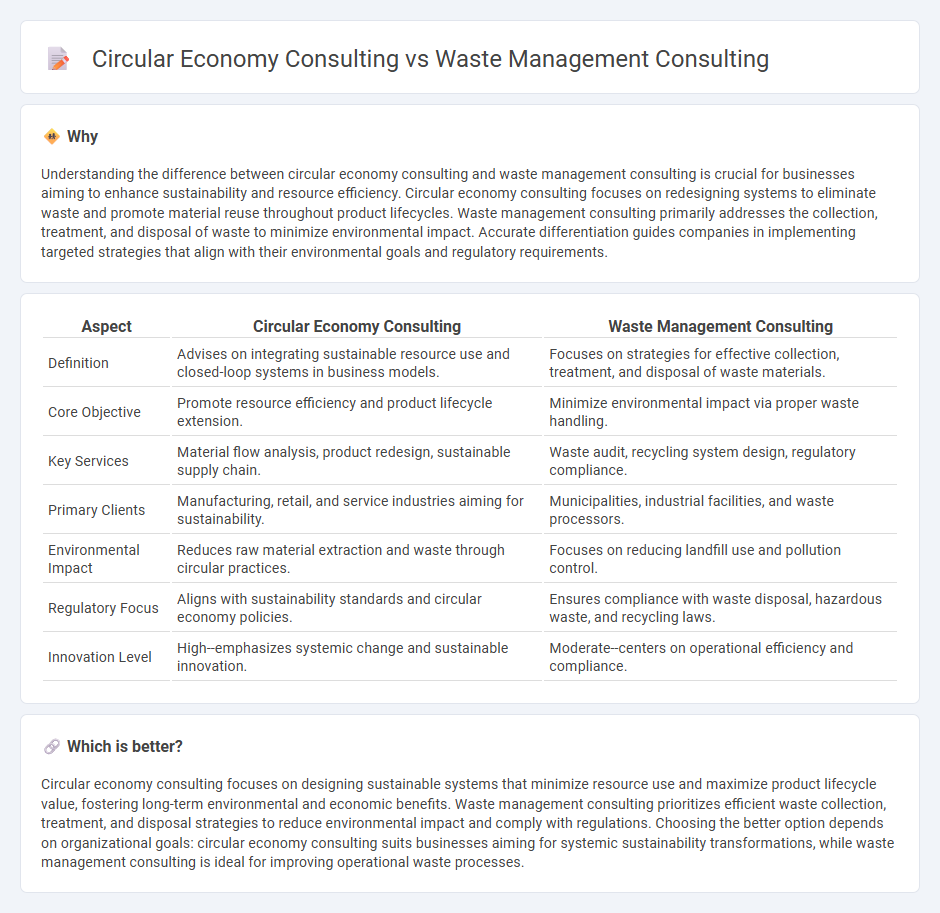
Circular economy consulting focuses on designing sustainable systems that minimize resource consumption and maximize product lifecycle through reuse and recycling. Waste management consulting specializes in efficient waste collection, processing, and disposal methods to reduce environmental impact and comply with regulations. Explore how these consulting approaches differ in driving sustainability and operational efficiency.
Why it is important
Understanding the difference between circular economy consulting and waste management consulting is crucial for businesses aiming to enhance sustainability and resource efficiency. Circular economy consulting focuses on redesigning systems to eliminate waste and promote material reuse throughout product lifecycles. Waste management consulting primarily addresses the collection, treatment, and disposal of waste to minimize environmental impact. Accurate differentiation guides companies in implementing targeted strategies that align with their environmental goals and regulatory requirements.
Comparison Table
| Aspect | Circular Economy Consulting | Waste Management Consulting |
|---|---|---|
| Definition | Advises on integrating sustainable resource use and closed-loop systems in business models. | Focuses on strategies for effective collection, treatment, and disposal of waste materials. |
| Core Objective | Promote resource efficiency and product lifecycle extension. | Minimize environmental impact via proper waste handling. |
| Key Services | Material flow analysis, product redesign, sustainable supply chain. | Waste audit, recycling system design, regulatory compliance. |
| Primary Clients | Manufacturing, retail, and service industries aiming for sustainability. | Municipalities, industrial facilities, and waste processors. |
| Environmental Impact | Reduces raw material extraction and waste through circular practices. | Focuses on reducing landfill use and pollution control. |
| Regulatory Focus | Aligns with sustainability standards and circular economy policies. | Ensures compliance with waste disposal, hazardous waste, and recycling laws. |
| Innovation Level | High--emphasizes systemic change and sustainable innovation. | Moderate--centers on operational efficiency and compliance. |
Which is better?
Circular economy consulting focuses on designing sustainable systems that minimize resource use and maximize product lifecycle value, fostering long-term environmental and economic benefits. Waste management consulting prioritizes efficient waste collection, treatment, and disposal strategies to reduce environmental impact and comply with regulations. Choosing the better option depends on organizational goals: circular economy consulting suits businesses aiming for systemic sustainability transformations, while waste management consulting is ideal for improving operational waste processes.
Connection
Circular economy consulting and waste management consulting intersect by focusing on minimizing waste through sustainable resource use and efficient waste handling strategies. Both fields emphasize closing the material loop, promoting recycling, reuse, and recovery processes to reduce environmental impact. Expertise in waste management supports circular economy goals by identifying opportunities to transform waste streams into valuable inputs, enhancing overall sustainability.
Key Terms
Resource Optimization
Waste management consulting emphasizes efficient collection, treatment, and disposal of waste to minimize environmental impact and ensure regulatory compliance. Circular economy consulting prioritizes resource optimization by redesigning processes to promote reuse, recycling, and sustainable product lifecycles, thereby reducing waste generation at the source. Explore how integrating these consulting approaches can enhance sustainability and operational efficiency in your organization.
Lifecycle Assessment
Waste management consulting emphasizes the efficient collection, treatment, and disposal of waste to minimize environmental impact, while circular economy consulting focuses on redesigning systems to enable continuous resource reuse and regeneration. Lifecycle Assessment (LCA) is a key methodology in both fields, providing a comprehensive evaluation of environmental impacts from raw material extraction to end-of-life stages, guiding decision-making for sustainable practices. Explore how integrating LCA can enhance strategic outcomes in waste management and circular economy projects.
Closed-Loop Systems
Waste management consulting specializes in optimizing the collection, treatment, and disposal of waste to minimize environmental impact and comply with regulations. Circular economy consulting prioritizes designing closed-loop systems that enable the continual use of resources, reducing waste generation at the source and promoting sustainability. Explore how integrating closed-loop principles in consulting enhances resource efficiency and drives long-term environmental benefits.
Source and External Links
Waste Management Consultant - ENGIE Impact - ENGIE Impact offers strategic waste management consulting that optimizes waste practices, ensures compliance, reduces landfill waste and carbon footprint, and supports employee engagement through data-driven audits and customized waste reduction roadmaps.
Waste Management Consultant - World Environmental, LLC - World Environmental specializes in comprehensive waste management consulting focused on pollution prevention, regulatory compliance, operational efficiency, and safe handling, storage, and disposal of various waste types to reduce environmental impact.
Waste management consultant - Buro Happold - Buro Happold integrates circular economy principles in waste management consulting, providing strategic designs and plans for waste reduction, recycling improvements, logistics efficiency, and regulatory compliance to achieve sustainable waste solutions and zero waste goals.
 dowidth.com
dowidth.com